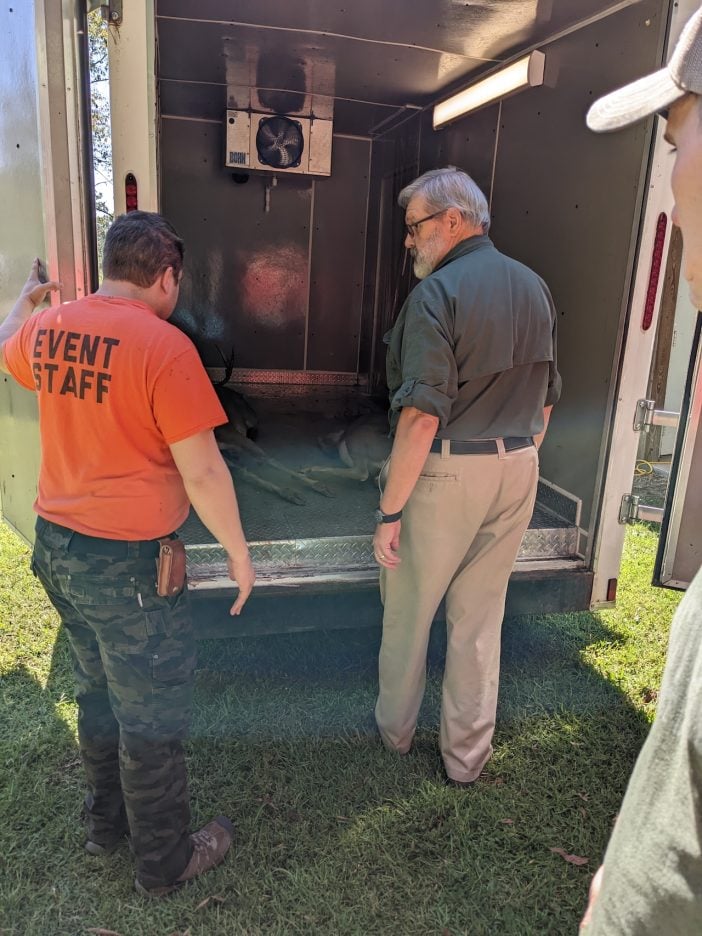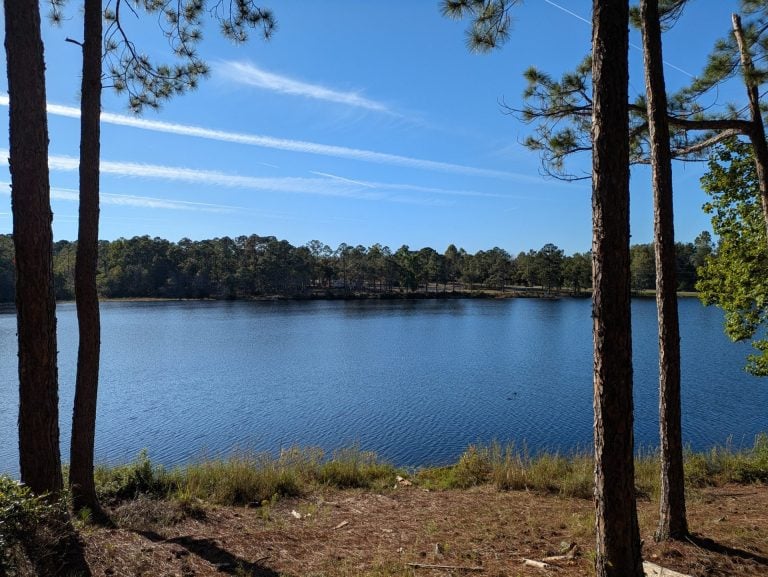6 Notes From Taking a Deer Hunting Class
I’ve never been hunting before. Not that I haven’t had the opportunity – I’ve had several of my awesome cousins, friends, and distant relatives offer to take me anytime. But I’ve never pulled the trigger (pun!) so to speak. Mainly because I kind of wanted to know what I was getting into and what the payoff was in a low commitment way (i.e., not getting up at 3am to drive into the woods and climb a stand).
Well, it turns out that the Georgia Department of Natural Resources offers a $30 Deer Hunting Class at the Charlie Elliott Wildlife Center. It’s a morning classroom session, lunch, and then processing a couple of actual deer in the afternoon. It’s not to be confused with a Hunter Education course to get a license. You go home with at least 5+ lbs of meat. I signed up and took it. Here are a few notes.
Hunting As a Tradition Is Complicated
Just to state a few things that are obvious…but also happening with hunting.
- hunting involves, you know, killing things…usually other mammals
- humans have killed off most all predators, so without hunting, the ecology of most regions gets all screwed up
- hunting is a Thing Humans Do™ – we’ve done it as long as we’ve been around; we’re arguably pretty good at it…and it sort of, you know, made us human
- hunting involves weapons, usually guns, which definitely have their own complicated reputation
- hunting is part of the outdoors, which most people are far removed from and out of touch with
- hunting has a certain…subculture…with its own reputational baggage
And I could go on. But, in short, hunting is one of those activities where you might have to say “but I’m one of the good ones” – unlike, say, baseball or gardening. And I’m not saying there is anything wrong with hunting. I’m all for it. I’m just saying that no one is announcing that “they are really into gardening but that they are definitely gardening ethically and thoughtfully”.
All that to say – the vibe of the class was very professional, welcoming, and serious in a good way. I really hate how much attention the small fraction of unsavory hunters bring to the activity. Based on the other attendees and the instructors’ approach, every hunter has a responsibility—not just for themselves, but to model good behavior and mentor other hunters who are learning. I love that.
For example, in the class session, they pushed all the “talking points” for why hunting is important for non-hunters. Here are the “reasons to hunt” straight from the education brochure –
- Wildlife Management: Crossbow hunting, like archery and other forms of hunting, can be an effective wildlife management tool used to promote the growth of healthy animal populations and improve habitats, especially in areas overpopulated with wildlife and in places where modern firearms are restricted.
- Recreation: Hunting provides outdoor activities for millions of Americans.
- Economic: Hunters contribute more than $13 billion per year to retail sales.
- Aesthetic: Hunting experiences in the outdoors can be deeply satisfying.
- Education: Hunting can provide a lifetime of learning experiences.
- History: Hunting can offer insights into history, cultural traditions, and the hunting heritage.
- Social: Hunting brings together people of all abilities and backgrounds.
- Therapeutic: Hunting offers an escape from the fast-paced and stressful demands of modern life.
- Health: Wild game meat is healthier than domestic meat raised for human consumption. Target shooting can also provide year-round activities for individuals and families.
Hunter’s Education Course
Hunting Can Be As Complex or As Simple As You Want
There are so many ways to hunt. And there is so much gear available for every style of hunting. It’s almost hard to imagine that for most of human history, we were hunting by, like, jogging or maybe throwing a stick with a rock on the end.
For a beginner with no context, it is absolutely overwhelming. That said, the class was incredibly helpful and welcoming for “dumb” questions. And honestly, like most things, the correct answer is “it depends on what you want to do.” Do you want to hunt for a trophy buck or just get meat? Do you have access to land? What weapons are you comfortable with?
Taking the class saved me soooo many hours and so much money simply by eliminating trial and error and getting a lot of perspectives and opinions quickly. Everyone likes “their” way of hunting and honestly doesn’t know a whole lot about other ways. So taking the class let me listen in on all the options quickly.
Environmentalists Need To Listen More To Conservationists
Most of the class was led by a Wildlife Educator – a longtime Department of Natural Resources employee whose only job is to figure out how to get more people to hunt, fish, and observe wildlife…and get them to do it safely.
However, one portion of the class was led by an actual Wildlife Biologist. What I deeply appreciated about his talk was the existence of tradeoffs. It’s easy to forget just how much control & supremacy humans exercise over our world. It was interesting to hear someone really get into the population dynamics of wildlife, reproduction rates, habitat change, food management, and coordination of public and private agencies in basic surveillance & monitoring.
And it’s easy to forget that, at least in North America, we brought back so many mammals from the edge of extinction with careful management of tradeoffs and a self-funding political model that exists to this day.
I live in the middle of the city and am very much in the “environmentalist” camp of people. It’s a camp that will side with the conservationist folks on most issues…but definitely has a more of a bent towards purity and preservation rather than “wise use”. This debate goes back to John Muir vs. Gifford Pinchot. There is no right answer or “teams” per se. But I do think there is less of a nuanced conversation between modern-day environmentalists who get attention and old-school conservationists who run most government & university institutions. Listening to the wildlife biologist made me appreciate more of collecting hard data and pursuing achievable win-wins, and getting people onside.
A Deer Produces A Lot of Good Meat
We got to process two deer (they were taken out of season by US Fish & Wildlife due to a farmer nuisance), and even take the venison home.

Ohhh wow – fresh venison from a deer that has been eating well in the forest is incredible. It’s lean – so it’s best in a roast or ground. But I swear that it has vitamins and minerals that just are not in grocery store factory farmed meats.
To me, harvesting sustainable wild meat is the #1 reason to pick up hunting. Also, getting to process the deer myself made the whole process so much less daunting. It’s one of those tasks that sounds impossible until you do it once – and it just clicks in place.
The US Needs More Educated & Ethical Hunters, but Time Pressures Hold Many Back
Now, the deep irony is that I took the class 2 years ago…and still have not actually gone. I have open invites from a friend, a cousin in addition to a spot on public land that I’ve scouted…and even the back porch of close relatives.
Why?
It’s hard to make time for it. On the procrastination matrix, it’s the perfect activity to put off. There’s a uncertain outcome; it’s hard to break down into smaller time chunks; and it requires several variables outside of my control (mainly legal deer season). And I think that’s generally why hunting as an activity is in general decline. Even people interested or open to it – just don’t have the (perceived) time and direct access that we had decade ago. Now, hunting is just another activity in direct competition with *waves arm at contemporary world*
But! The Hunt + Learn class definitely got me a step closer. It was an incredible experience in and of itself. And it “paid for itself” with several pounds of free meat (even more if I had brought a bigger cooler!). The class was definitely worth recommending even if I never go. Kudos to the Georgia DNR for putting it together.





